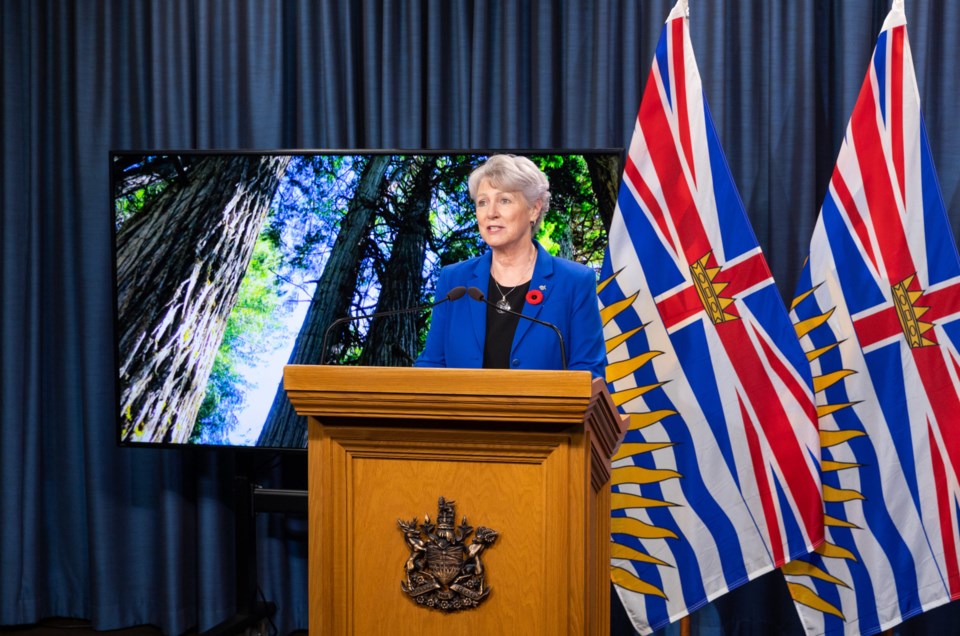Parts of British Columbia’s business community is expressing disappointment the province's 2023 budget didn’t put more focus on reducing costs for the private sector or on generally improving business conditions.
"While today’s budget focused on affordability and reducing the cost of living, it provided little support to businesses who are struggling with the cost of doing business,” Fiona Famulak, president and CEO of the BC Chamber of Commerce, said in a press release. “Today’s budget did not take meaningful steps towards addressing the concerns that we have raised.”
Famulak said that the $15-per-tonne increase in the carbon tax was of particular concern, and that little was done to help businesses offset that cost. While the BC Chamber of Commerce did not feel the budget adequately addressed the current business climate, Famulak highlighted that the provincial government did take into consideration some of the chamber’s concerns by setting aside $77 million to help deal with permit delays and $58 million to address delays in foreign credential qualification.
Famulak also said that she is optimistic the $480 committed to the Future Ready Plan will help businesses tackle what she called a critical labour shortage. However, she pointed out that details of the plan are unclear and that business groups will be working to understand exactly what it does.
The Greater Vancouver Board of Trade (GVBOT) reported it felt similarly. It awarded the budget a letter grade of C-, citing particular concerns about the government’s economic vision and the province’s tax competitiveness.
“There is scant mention of small business, innovation, manufacturing, or business issues in general within the budget document,” read a statement from the GVBOT.
The GVBOT also applauded permit funding and the Future Ready plan as positives from the budget, along with the additional $6 million for a new critical minerals strategy. It was, however, disappointed that more was not done to address the concerns of ailing businesses.
“Our members had hoped for measures to offset the rising costs of doing business, but found no relief in Budget 2023,” Bridgitte Anderson, president and CEO of the GVBOT, said in a statement. “Unfortunately, the budget is essentially silent on an economic strategy to attract investment, and increase our innovation capacity and competitive advantage. With a slowing economy and a growing population, we need a strong private sector and competitive investment conditions to increase prosperity across the province.”
When it comes to provincial taxes, the business community was largely ignored. Business groups including the GVBOTand the sa国际传媒 Chamber of Commerce had requested increasing the threshold for the employer health tax and were hopeful the government would reverse it to phase out the PST rebate on machinery and equipment.
“A step such as adjusting the Employer Health Tax threshold would have demonstrated that government is willing to address the challenges that many of our members face,” Famulak said. “Unfortunately, that opportunity was missed.”
Perhaps surprisingly, business groups generally supported increased spending on social infrastructure. The GVBOT said it was appreciative of the sizable investment in things like healthcare, mental health, rapid response and crime prevention. Famulak said these issues have a direct impact on businesses and that the chamber was also supportive of these investments.
The Surrey Board of Trade and its CEO, Anita Huberman, were pleased to hear about local infrastructure investments in housing, schools, hospitals and transportation. However, she added that the board was frustrated by the lack of investment in Surrey Memorial Hospital compared to that of hospitals elsewhere in the Lower Mainland. While she praised the Future Ready plan, she too was concerned about the lack of a concrete plan.
The budget also commits a record $37.5 billion in capital spending over the next three years, which was applauded by the sa国际传媒 Building Trades
“These projects also present an opportunity to invest in local workforces by supporting apprenticeships, reaching out to Indigenous workers, women and other underrepresented groups and giving them opportunities to make their personal mark on the projects that will shape this province,” said Brynn Bourke, executive director of the BC Building Trades.
Bourke also said that the group was pleased to see $12 million for the Employment Standards Branch to address a backlog and improve worker access. They also agreed with the business community’s recognition of the importance of mental health spending and the Future Ready plan.
Despite large capital spending and investments in both physical and social infrastructure, some were concerned about the lack of investment in resource development.
“British Columbians should be deeply concerned that the single greatest thing that sa国际传媒 can do for the economy, for climate, and for First Nations reconciliation, which is to say building up the LNG opportunity, receives but three cursory mentions in the budget document,” Stewart Muir, CEO of Resource Works, said in a statement.



